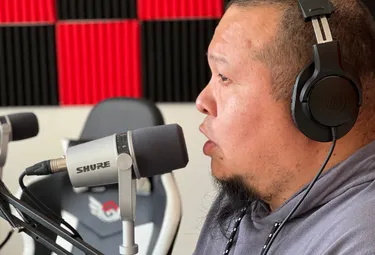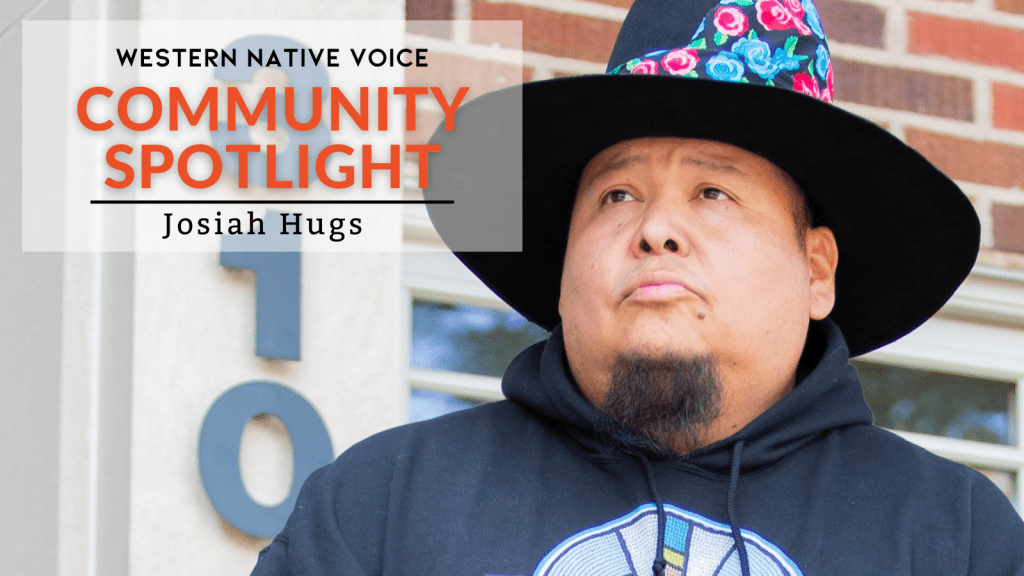
A Warrior’s Walk on the Red Road to Wellbriety
Western Native Voice works year-round to inspire Native leadership so our communities flourish. We are excited to share with you Western Native Voice Community Spotlight, designed to highlight grassroots organizing and individuals creating change from across Montana and in Indian Country.
This month, we would like to introduce Josiah Hugs of Billings. He is Apaasalooke and an enrolled member of the Crow Tribe. Josiah has been a blessing to the Billings community by sharing his story to people on the streets and those suffering with addictions. He was instrumental in starting a talking circle in Billings and is now on a weekly podcast called Unspoken Words, a Native Podcast.
Tell me a little about yourself.
My name is Josiah Hugs, I am from the Apsaalooke Nation and I am 39 years old. I grew up in the Arrow Creek district of the Crow Reservation, Pryor, Montana. I have a wife, Taleshia Hugs and 3 children Billy, Taiah and Jaxon. I am the youngest of 4 kids. Growing up, basketball was huge in my family. Basketball and church is what happened at our house. We grew up being sheltered from the world out in the country. We were sheltered from cultural things too. I did a lot of chores growing up on a ranch. One day, when I was little, I was looking down the road and something connected with me, and I thought…if I follow this road, I can go anywhere.
Tell me about your role models.
My parents’ faith really inspired me.They were dedicated Evangelical Christians. As a child, I was always busy with church for four days out of the week and we had at home bible studies. In the early 70s, my parents both quit drinking and they clung on to their faith because it worked and kept them sober. My dad, Jerome Hugs, Sr., taught me intentionalism and showed me how that worked. He also used basketball to teach me about life, faith, decision making, and girls.
I was inspired by my mom, Dora Mae Hugs, as well. I watched her teach school on the rez. She had a teaching degree and I could see her dedication. She showed up everyday to work and dealt with difficult situations at school but that didn’t stop her from her mission. That’s huge for me today.
When I had days off in high school, my mom would take me to school with her to clean or help at school. She would figure out something for me to do such as help kids with reading…that was my first taste of giving back. I was like a teacher’s aide. Now I realize what they were teaching me…even though it wasn’t spoken.
“I was looking down the road and something connected with me, and I thought…if I follow this road, I can go anywhere.”
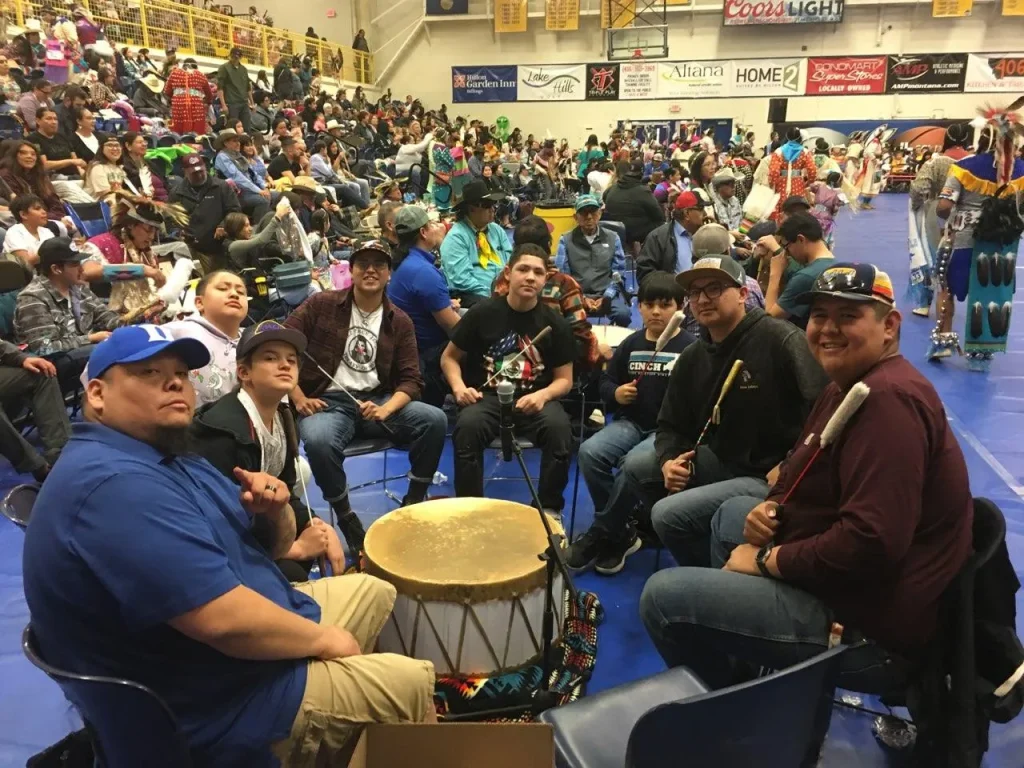
Tell me about your addiction.
I first went to treatment when I was 31 years old. During that time, I managed to still show up for work and did enough to get by. I was about to lose my job and finally admitted I had a problem. I stayed sober for 8 months. By the time I was 32, I was working at BIA, had gone through 2 divorces, and I was drinking half a gallon of vodka every day. I was alone and living in a one bedroom apartment in Billings.
What got you to that point?
I had quit drinking yet again and had been 8 months sober doing it on my own, white knuckling it. I wasn’t dealing and feeling with my emotions and I ran from responsibilities and problems. I entertained the thought of drinking in my mind for a full month before I took a drink. As I got more into my addiction, I got more delusional about the trail of destruction I was leaving behind me. My kids didn’t have their dad, and my parents and exes were worried about me. I didn’t have any coping skills. That year my uncle passed away, my childhood friend was murdered and another friend passed away. I was headed for my 2nd divorce. I fell into depression. I fell into this place where I couldn’t remember a time when I was genuinely happy. It was the lowest time in my life. I even told myself I would drink beer instead of vodka. Within a week, I was back to drinking half gallon of vodka every day. Four months later I went back to treatment.
I went into Rimrock Foundation detox facility still drunk on September 9, 2015 at 12 noon. That night, while the alcohol was still wearing off, I was toughing it out and was afraid to go to sleep. A technician sat at the foot of my bed and told me his story of addiction. He was “12 stepping” me. He told me how he stayed sober and what his life looks like today and it sparked a little hope in me. I wanted that. It was a tiny spark that I grabbed onto. I heard his story and realized I wanted to do that…I wanted to help people…whatever that looked like.
“I heard his story and realized I wanted to do that…I wanted to help people…whatever that looked like.”
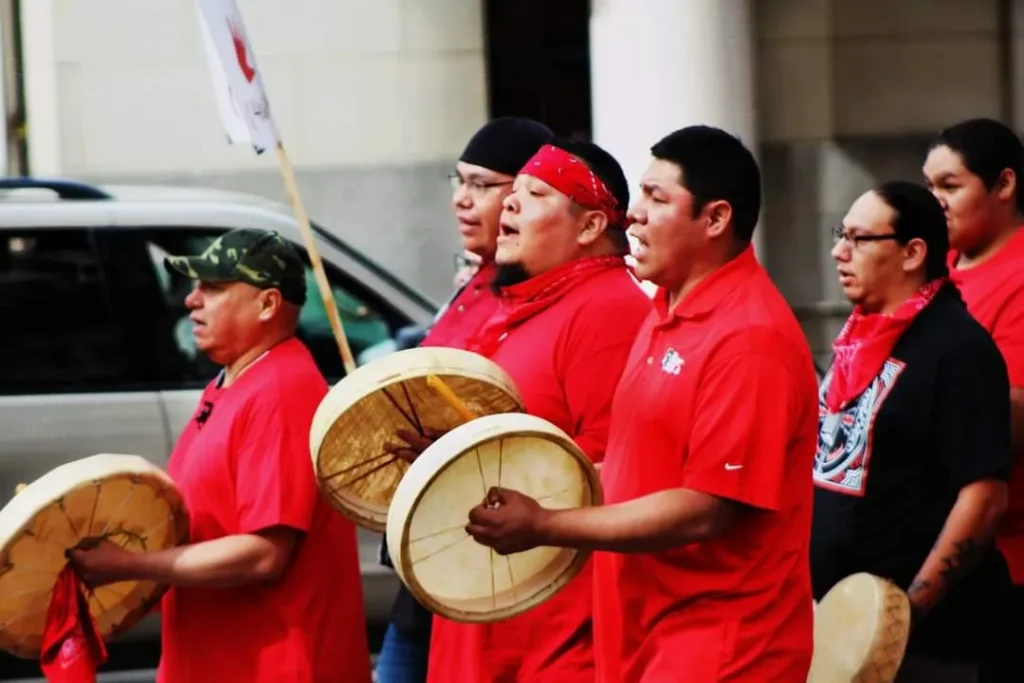
After treatment, what action did you take?
I started a talking circle. I read the book “The Red Road to Wellbriety”. The author received all these teachings from tribal elders. It talked about what the 12 steps do and how our ancestors were already living that way and doing those things. It is a call back to our culture. It teaches a way of life. Before I read this, I had probably quit 100 times. But understanding mindfulness and connectedness… it finally clicked. Wanting to share what I learned, I decided to start a talking circle. Because with the talking circle I realized then that I could stop what I was thinking in my mind and change it. I also finally understood how my anxiety and depression fed into my drinking.
Tell me about the talking circle.
The White Eagle Talking Circle is a safe space for anyone battling any kind of addiction, where they come and vent, talk about their day or their struggles. It’s somewhere they can come to express themselves and not be ridiculed. We start meetings with a smudge and a prayer. We pass a rattle, item or sweetgrass to the left. When you have the item it is your turn to talk. Then they pass it on to the next person.
Where does your talking circle meet?
When I went looking for a venue, I went to all the Native organizations I knew in Billings. They all said no…closed doors. I went to all the main street establishments as well to see if they would host me. Finally, the Billings First Church opened their doors and provided us a place. We celebrated six years of talking circles on March 10th. We have a core group of nine people. Pre Pandemic, we had speaker meetings and 90 people would show up. We advertise through the Billings Wellbriety movement on Facebook. We met one night a week in 2016. Pre Pandemic, we grew to four evening meetings and a noon meeting M-F. Today, we have four evening meetings in the same location.
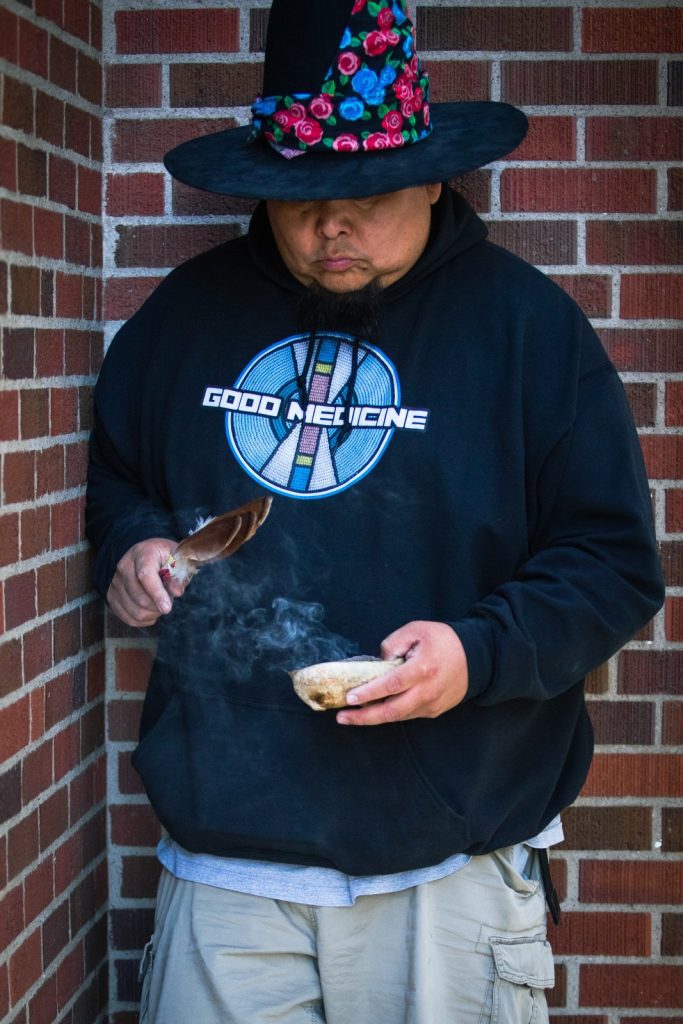
“Maybe they will smell home…remember grandma’s teachings or ceremony.”
Tell me about your work on the streets of Billings.
It all started when I met Lisa Harmon, the former CEO of Downtown Billings Alliance. She started homeless treatment services. I was thinking about leaving the BIA and emailed her my resume, She offered me the Resource Outreach Coordinator position and I said yes. In June 2017, I started on the streets and worked with 2 police officers. I tried to be a presence and meet the homeless population where they were. Instead of calling 911, a business would call us and I would go with the police officers to the location. They would start a conversation with the homeless person and they would introduce me and they would step aside. I would start talking with them about services available in Billings and share my story with them. The idea was to help them get into services that would help them get off the street. After a while, I noticed I got a different response if I went without the police. About 80% of the people on the streets in Billings are Native American. Of that 80%, most are here to drink and drug and just want to be left alone. A lot have been to treatment multiple times and some could be addiction counselors because they know the program so well. Even so, I would plant a seed and go see them again and again and just keep watering that seed. There are some on the streets that are circumstantial, like divorced, lost job, etc. I plugged them into services and that population was easier to funnel into the right services and then I wouldn’t see them again.
I had met one 29 year old male on the street and got him into sober living. He had some health issues so appointments were made for him. He called me one night in sheer panic and said he had two appointments tomorrow and didn’t know what to do. It hit me that this man has never had an appointment as an adult. I had to explain step by step what to do. That told me how much brokenness he came from…to not have that basic understanding of what to do.
I have been smudging and praying on the streets of downtown Billings since 2018. I smudge to alert the Native people’s sense of smell. Maybe they will smell home…remember grandma’s teachings or ceremony. We pray that the downtown businesses, judicial systems and police officers “keep humanity” in their interactions with the people.
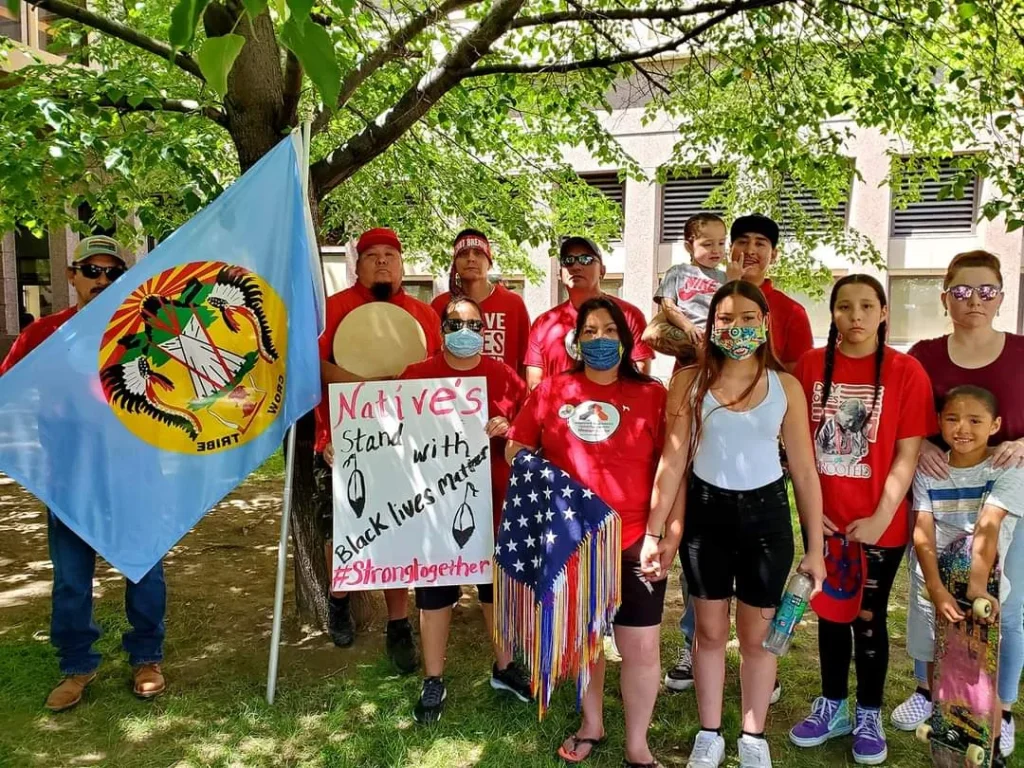
Tell me where you are now.
After a while, I became an addiction counselor and worked for the Billings Urban Indian Health and Wellness Center. After a couple years I realized that counseling wasn’t for me. I transferred over to the Suicide Prevention and learned a lot about protective factors, focusing on anything positive in your life and started promoting those things. While there, we ran a youth day camp for suicide prevention and started holding talking circles, and game night. I loved working there and sharing my stories. I wear my recovery on my sleeve so that it will help someone.
An opportunity came up with Billings Clinic with the Diversity Equity and Inclusion and Belonging program which is a Native American Liaison position. I realized that this position was going to make it so that physicians and nurses would have a better experience with Native patients. I could help make it better for both parties.
Are you on any boards or hold any offices?
I am on the YMCA Board, Steering Committee for Native American Development Corporation. Volunteer Coach at YMCA, soccer, basketball, flag football for the past 8 years. I serve as a Native American Cultural Consultant for Off The Streets and various other organizations throughout the region. As for politics, I come from a political family on the reservation and feel like the family is already contributing a lot. I don’t need a title to help people.
“I wear my recovery on my sleeve so that it will help someone.”
Tell me about your podcast.
November 6, 2020, my friends Randy Beardontwalk, JC Beaumont and I started a podcast. It is called the Unspoken Words. We are all sober. During the pandemic, we wanted to share our experiences, strength and hope to a broader audience. There are some people in AA who look down on talking circles and would say that it is not real sobriety. So we share the message that the Red Road teachings were here thousands of years before AA and treatment centers. We call for a return to our cultural teachings.
A new episode of Unspoken Words, A Native Podcast is uploaded every Thursday evening. Time: 90 minutes
We are naturally gifted in storytelling and we like to have a lot of fun and laugh on the show. We do get serious and discuss recovery from addiction subject matter in the last 45-60 minutes of the show. Our main platform is Podbean but you can find us wherever you listen to podcasts.
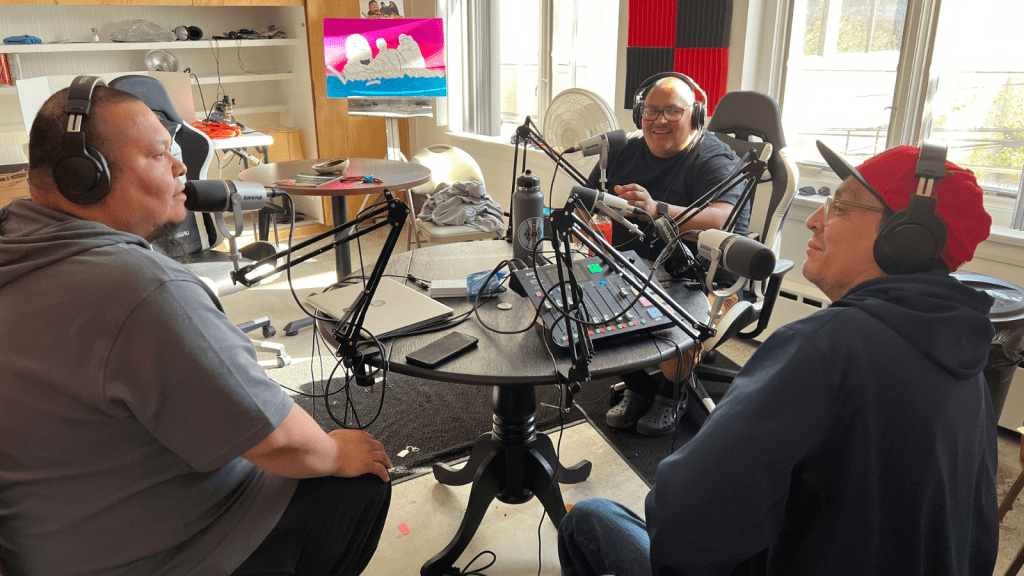
“We share the message that the Red Road teachings were here thousands of years before AA and treatment centers.”
What is your vision for your future?
At the end of my career, I will have established an inpatient treatment program that is long term, where we can preach the wellbriety gospel. It will be a place where Native people can come to reset and move forward in a good way.
Any final words you want to share with our readers?
You don’t need a title to help someone…to help people. Our ancestors lived a life of accountability, transparency, community and service work. As a warrior…day-to-day, you were called to be selfless. Four areas make up a person; mental, emotional, physical and spiritual…to be mindful of that everyday. How are your people doing in these four areas? Put the needs of the band and village over your own.
